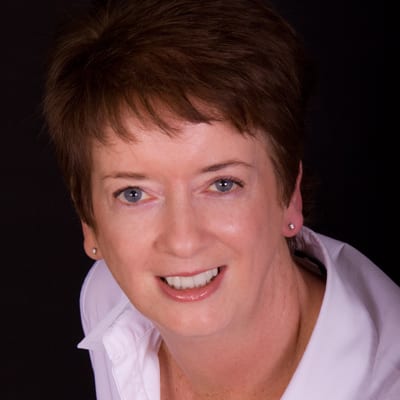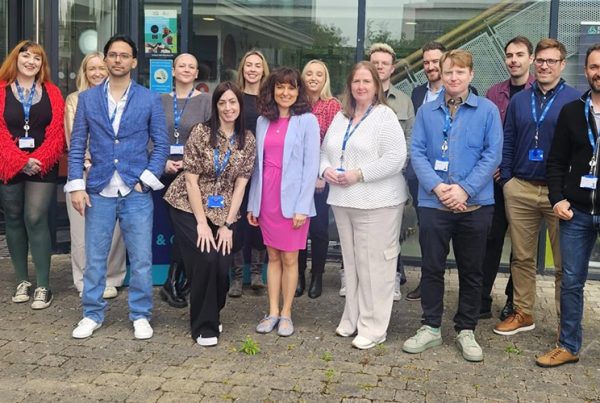
 Paula Carroll is the New Frontiers National Programme Manager at Enterprise Ireland. She is the connection between Enterprise Ireland and the 18 locations that deliver the programme around Ireland. Her role is incredibly varied and on any given day she may be welcoming new participants on the programme via Zoom (at the moment), running a programme managers’ meeting, or promoting the programme on the radio or in press interviews. If you’ve been to any New Frontiers events, pre-Covid, you may well have met Paula as she makes a point of attending showcase events and launches across the country.
Paula Carroll is the New Frontiers National Programme Manager at Enterprise Ireland. She is the connection between Enterprise Ireland and the 18 locations that deliver the programme around Ireland. Her role is incredibly varied and on any given day she may be welcoming new participants on the programme via Zoom (at the moment), running a programme managers’ meeting, or promoting the programme on the radio or in press interviews. If you’ve been to any New Frontiers events, pre-Covid, you may well have met Paula as she makes a point of attending showcase events and launches across the country.
I caught up with Paula to find out how the past 18 months have affected the programme and what plans she has for New Frontiers as we emerge from this latest lockdown.
Scarlet: I know you put a lot of work earlier this year into conceiving the national marketing campaign that people may have already come across. There have been ads on media sites and social media, plus some interesting articles in the newspapers. Can you tell us a bit more about the campaign?
Paula: Enterprise Ireland hasn’t undertaken a national marketing campaign for New Frontiers in the past number of years, which meant that awareness of the programme spread more as a result of word of mouth, recommendations from the Local Enterprise Offices (LEOs), referrals from alumni, local campaigns conducted by the Institutes of Technology or universities, and of course via this site which acts as a kind of central hub.
We decided that it was time to raise awareness at a national level, and so with the Enterprise Ireland marketing team, we implemented a national marketing campaign to achieve this. We settled on a campaign theme, which focuses on ‘turning dreaming into doing’, as we felt this really encapsulates what New Frontiers is all about.
We want to encourage people who have had that little voice at the back of their heads for a while to take the leap to entrepreneurship through the programme. So, we’ve featured some great case studies in our campaign (you can read these here on our blog, they feature Ivan Tuohy, Derya Sousa, and Conor Grimes) and used ads on media websites, social media, and the radio to spread the word. We really wanted to highlight the huge impact New Frontiers has had on our alumni.
If you’re a potential entrepreneur, or even a business advisor or investor, we encourage you to look into New Frontiers if you’ve never heard of us before. It’s a well-established programme run by passionate, expert programme managers and located in the country’s best incubation centres. It’s not just a door to Enterprise Ireland or Local Enterprise Office funding; the facilities, networking, access to expertise, and third-level research capability make it unique in Ireland and even abroad.
Scarlet: For those who don’t know much about New Frontiers, we have lots of practical information right here on the site. But could you tell us a bit more about the background of the programme? Any insider knowledge we should know about?
Paula: People sometimes assume that New Frontiers is a new programme. In fact, it dates back to the late 1990s, when it was known as the Enterprise Platform Programme (EPP). Enterprise Ireland took over the programme in 2012 (it was previously run by the Institutes of Technology). Since that time it has become a really important part of Enterprise Ireland’s regional strategy. New Frontiers runs in 18 locations around the country, so it is a key part of our national approach to encouraging entrepreneurship. Today, 59% of participants are outside of the Dublin area, so there is a real geographic spread.
Since 2012, over 4,000 people have been through Phase 1 of the programme and around 1,500 participants have completed Phase 2 (the full-time phase lasting six months). 32% of alumni are women and 68% are men. We really encourage women to apply, because we believe this should be an even split. The stipend paid during Phase 2 should ensure there isn’t a barrier to any particular group being able to commit to a full-time programme.
We carried out a comprehensive evaluation of the programme, which was published last year. Some interesting statistics that came out of that were:
- 25% of alumni go on to receive additional Enterprise Ireland support
- There is an 83% survival rate for New Frontiers companies
- We identified an attributable turnover of €302 million for New Frontiers companies (2012-2019)
- Alumni give us a net promoter score of 86
Scarlet: I know that the content and delivery of the programme is very important to you. Can you tell us a bit more about that, and what changes might be coming?
Paula: It’s really important that the programme stays relevant for participants. We review it constantly and we’re always ready to improve or change things as necessary. Last year, when the first lockdown kicked in, we had to adapt very quickly to ensure that people in the middle of a programme were not adversely affected.
New Frontiers went from 100% in-person to fully online overnight. That was a huge challenge, and it is a testament to our programme managers and their teams that this transition happened with minimal disruption. No one was ready for a national lockdown, but everyone, including the institutes and technological universities that deliver the programme locally, has been amazing.
There were, of course, trade-offs in going online. A big benefit of New Frontiers that alumni often mention to us is the opportunity to network and share insights with other participants. That’s a hard thing to fully replicate via Zoom or Teams. On the other hand, we realised that some of the material from the programme is just as effective when delivered virtually. If a workshop, for instance, is held online, this can help a participant save on travel time and costs while getting just as much value from the education as if they were in the room.
I can see that in the future we will offer a bit more flexibility in how the programme is provided. This means that participants in remote rural areas might be more inclined to apply because they won’t have to travel in every single day. It also means that participants will have access to the full list of mentors from the EI Mentor Network, regardless of where the participant or mentor is physically based. This will be of huge benefit, particularly if niche expertise is requested.
So, post-Covid, I think we’ll see Phase 1 happening mostly online and Phase 2 taking a blended approach – most likely 80% in-person and 20% online. The in-person interactions are so important to entrepreneurs that we will make sure they stay. The support, advice, encouragement, and even friendly (?!) rivalry that occurs within any cohort is an enriching feature of the programme.
Scarlet: That’s so true, lots of our blogs by alumni mention how important the interpersonal relationships were to them. What other changes are we likely to see coming to the programme in the coming months and years?
Paula: We recently secured a new tranche of funding for the programme so that it can run for another five years. But we also managed to secure funding to implement a funded Phase 3 for the programme, having successfully trialled this previously. This means that each year there will be 30 – 34 funded places on Phase 3, which will be distributed across the programme geographically.
These spots will be for the startups that have the potential to become Enterprise Ireland High Potential Start-Ups (HPSUs). Our HPSU Unit will work closely with these entrepreneurs with a view to fast-tracking them to HPSU status. It’s a great opportunity.
Enterprise Ireland has a platform called EI Learn, which is made available to Enterprise Ireland clients. In the future, we’ll be making more use of this system by giving New Frontiers participants access to the large volumes of learning content that is available on it, with our own area where they can also interact with each other.
We know that there are some sectoral or knowledge niches where entrepreneurs need extra support and we’re looking at creating specific content to meet these needs, potentially bringing in expertise from abroad. This of course wouldn’t be feasible for face-to-face situations, but thanks to the EI Learn digital platform it’s now a real possibility.
New Frontiers is heading into its second decade with a great track record and an amazing team of experts ready to help the next generation of entrepreneurs turn their dreams into reality. If you think New Frontiers might be for you, check out the eligibility criteria and then register your interest at your preferred location. Intakes for each location’s Phase 1 and Phase 2 happen at different dates throughout the year, but you can keep an eye on deadlines for applications over on our calendar page.
About the author
 Scarlet Bierman
Scarlet Bierman
Scarlet Bierman is a content consultant, commissioned by Enterprise Ireland to fulfil the role of Editor of the New Frontiers website. She is an expert in designing and executing ethical marketing strategies and passionate about helping businesses to develop a quality online presence.
 Scarlet Bierman
Scarlet Bierman








